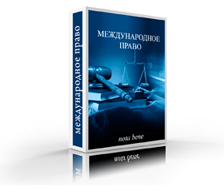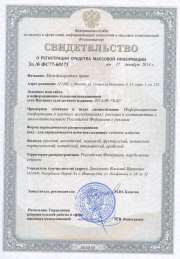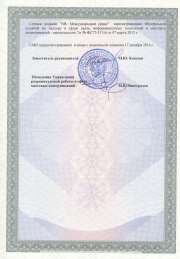MAIN PAGE
> Journal "International Law"
> Rubric "History of international law"
|
History of international law |
|
Belkovets L. - Still enemies or already "friends" and "partners"? (to the problem of the Russian debt obligations at the conferences in Genoa)
|
|
pp. 28-38
|
DOI: 10.7256/2306-9899.2016.3.18633
Abstract: The Ukrainian default, which violated the debt obligations concerning Russia, revived the issue regarding the debt cancellation of the imperial and provisional by the Soviet authorities. The article explores the position maintained by Soviet Russia in this regard at the Genoa international conference in April-May of 1922. The object of this research is the discussion pertaining to the economic policy of the Bolsheviks, who came to power in the October of 1917, and entered upon the “socialistic” experiment in the country, which was withdrawing from the war and revolutions. The author examines the combination of historical and legal facts, as well as applies the method of their scientific assessment based on the achievements of the Russian and foreign historiography. The conclusion is made about the development of the original policy orientation of the Soviet government aimed at establishment of the equal friendly relations with the capitalist countries. The author notes the effort of the Soviet diplomacy regarding the cancellation of Russia’s debts ad recognition of the new Russian government by Germany and other Western countries – nations of the Triple Entente.

|
Skobina E.A., Rozhkova N.A. - Significance of the World War II for the development of public international law
|
|
pp. 34-43
|
DOI: 10.25136/2644-5514.2018.4.27620
Abstract: This article examines the significance of results of the World War II for development of the norms of international humanitarian law. Relevance of the topic is substantiated by the need to disprove the repeated attempts of falsification of the outcome of war and rehabilitation of fascism through enacting the legislative bills by various countries. The goal of this work is to demonstrate the transformation and implementation of the norms of warfare in the international law. The subject of this research is the norms of Nuremberg trials and their introduction into the Russian legislation. The set goal is achieved through using the methods of historical and retrospective analysis and comparative study. The field of application of the research results in the international criminal law. The author reveals the peculiarities of creating the generally recognized norm of international law that condemns the rehabilitation of fascism. A conclusion is substantiated that after the World War II was invented a mechanism for exercising the norms of identity protection during the armed conflicts at the international level, including the criminal prosecution on the persons guilty of violating the laws and customs of war in accordance with the international law. The improvement of norms of the international criminal law allowed prosecuting military servants for execution of an unlawful order of the officer with evident violation by the latter of the norms of humanitarian law. One of the important lawmaking results of the World War II became the creation of legal standards of human rights as a set of effective legal norms of international law.

|
Logvinova I.V. - Constitutional grounds of the international activity of the Republic of the Soviet Union: historical-legal aspect
|
|
pp. 39-53
|
DOI: 10.7256/2306-9899.2016.3.20045
Abstract: The subject of this research is the constitutional regulation in the area of international activity of the Union Republics. It is necessary to study the historical context of the problem of legal coverage of the international relations of the constituents of the federative nations (based on the example of the Soviet Republics) for understanding the modern status of the established constitutional-legal regulation in this field. The Soviet experience was unique due to the fact that the formal legal status of the republics significantly differed from the actual constitutional practice. Most vividly, we can follow it analyzing the constitutional powers of the Soviet Republics in the area of foreign affairs and practice of their realization. The article interdependently examines the established since February 1, 1944 constitutional-legal regulation and practice of its implementation in the area of foreign affairs of the Soviet Republics. This allowed making the following conclusion: the formal constitutional-legal status of the Union Republics (which included such essential component as the possibility to realize the foreign affairs), as well as their practical status had serious discrepancies. In fact, the Union Republics realized just the separate powers in international activity, under the absolute control and with participation of the Union leadership; thus we can say that the Republics had only separate elements of international legal capacity, which were determined on the Union level.

|
Trofimov E.V. - International legal initiatives in the 1970Тs on the global anti-corruption policy: the problems of criminalization and administration of questionable transactions of transnational corporations
|
|
pp. 45-66
|
DOI: 10.25136/2644-5514.2019.1.28900
Abstract: The subject of this research is the acts and other international legal documents of international organizations adopted or drafted in the 1970’s related to the questions of anti-corruption managements, practiced by transnational corporations in the accepting countries, including the acts and other document of the United Nations, Organization for Economic Cooperation and Development, International Labor Organization, and International Chamber of Commerce. The article also examines the related acts and other documents of administration and Congress of the United Stated of the 1970’s. The first wave of the global anti-corruption initiatives (1970’s) was caused by the negative attitude towards the activity of transnational corporations in the accepting countries. Within the framework of the UN “soft” law, were adopted the acts against corruption practices of transnational corporations. After the promulgation of the scales of illegal and unethical activity of North American corporations in the developing countries, the United States adopted the Foreign Corrupt Practices Act of 1977, as well as initiated the formulation of international documents of similar content. The corresponding documents were adopted by the Organization for Economic Cooperation (1976) and International Chamber of Commerce (1977), but they carried a recommendatory character and were referred to corporations, rather than the countries. During the 1977-1979, the subsidiary bodies of the United Nations Economic and Social Council upon the initiative of the United States developed a project of international agreement on the illicit payments, but encountered opposition from the majority of the developed countries, as well as generated discussions with the developing countries, due to which in the 1980’s this project was scrapped.

|
Gorian K.V. - Contribution of the Catholic Church into the development of international law of human rights
|
|
pp. 47-57
|
DOI: 10.7256/2306-9899.2016.2.18375
Abstract: This article explores the developed within the framework of Catholic religion as a culturological term system of views and ideas on the international public law as a whole, as well as the international law of human rights in particular. The subject of this research is the international legal documents along with the doctrinal formulations which define the essence and the content of Catholic concept of international law. The author gives characteristics to the system of sources of the Catholic concept of international law, as well as the role of the pontifices – heads of the Holy See in the formation of not just contemporary concept of human rights, hut also modern international law. Catholic concept of human rights is based on a metaphysical foundation, according to which rights and responsibilities subordinate to highest commandments to love God and your neighbor as yourself. The modern international law has been establishing within the framework of Christian religion; the founders of the human right concept are the representatives of the Spanish school of international law. Special place in formation of the human rights concept belongs to pontifices of the Holy See, who announce the issues faced by the global community and suggest ways for their solution based on the Christian doctrine; they also underline the correlation between the human rights and preservation of the habitat, as well as the mankind responsibility for protection of the environment.

|
Pashkovskaya I.G. - Stage of establishment of the political-legal foundations of the foreign energy policy of the European Union
|
|
pp. 47-63
|
DOI: 10.7256/2306-9899.2016.4.21429
Abstract: The subject of this research is the process of establishment of the political-legal foundations of the foreign energy policy of the European Union. The object is the adopted by the EU member-states and EU institutions political and legal documents, which set the goals, tasks, principles, and main directions of realization of the foreign energy policy of the European Union. The author carefully examines such aspects of the topic as the attitude of the two leading heads of the states and governments of the EU member-states and chiefs of the EU institutions towards the formation of the single foreign energy policy of the European Union. Special attention is given to the study of the legal power of the documents, the positions of which comprise the foundation of the EU foreign energy policy. The main conclusion consists in determination of the three stages of establishment of the political-legal grounds of the EU foreign energy policy. The author’s main contribution lies in the fact that this article represents an integral, united by the single concept innovation research, the conclusions of which carry great practical importance for the achievement of efficiency in the process of cooperation between Russia and EU member states, as well as EU as a whole, in the area of energy. The scientific novelty consists in determination of the possible ramifications of realization of the EU foreign energy policy for Russia.

|
Grigor'eva O.G. - Participation of the USSR in Formation of International Grounds for Legal Assistance in Civil Affairs
|
|
pp. 76-115
|
Abstract: The article describes the genesis of participation of the Soviet Union in formation of international grounds of legal assistance in civil affairs which was conditioned by the development of international relations, integration processes and other objective reasons. The author of the article describes the USSR participation in activities conducted by such international organizations as the League of Nations and United Nations (since 1945). The author also analyzes the prerequisites for the USSR joining the Hague Convention of of 1954 (on Civil Procedural Issues) in 1967 and the Hague Convention of 1961 (Abolishing the Requirements of Legalization for Foreign Public Domains) in 1991. The author shows the important influence of the Council for Mutual Economic Assistance on development of legal cooperation between socialistic countries. The author also studies the process of developing a many-sided convention on international legal assistane of the countries of people's democracies and analyzes the reasons why that convention was not adopted.

|
Shebanova N.A. - International obligations and assets of the former USSR: problems of dividing and practical solution.
|
|
pp. 88-166
|
DOI: 10.7256/2306-9899.2013.3.8764
Abstract: The payment of an external debt of the Soviet Union and dividing of its foreign assets was a serious problem, appearing due to the breakup of the Soviet Union. The former Soviet Republic had to figure out the legal capacity of the Russian Federation, agree upon the means of payment of an external state debt, which was a necessary and obligatory condition for the division of state property abroad. The generally recognized way of regulating disputes in international relations is an international treaty. This article contains analysis of the attempts to achieve agreement among the former Soviet republics by conclusion of international multilateral treaties within the frameworks of the USSR and later the CIS. In addition to the analysis of problems regarding implementation of international state obligations, the author pays attention to the debts of the former USSR to the private persons, and various approaches towards this issue. The object of studies in this article includes specific features of solving the problems regarding payment of external debt and dividing the foreign assets of the former USSR as well as the de facto results.

|
Grigor'eva O.G. - Theoretical bases for the international legal assistance in civil cases in accordance with the Soviet legal science.
|
|
pp. 215-306
|
DOI: 10.7256/2306-9899.2013.1.344
Abstract: The article is devoted to theoretical basis of the institution of international legal (inter-court) assistance in civil cases. The author studies historical prerequisites of formation of this institution in the Soviet law. She analyzes the theoretical developments of the Soviet civil law scholars and procedural law scholars in the sphere of definition and nature of international legal assistance in civil cases. The author provides her own definition of the term "international legal assistance on civil cases", and she provides a historical picture of formation of this term in the Soviet law and international treaties of the USSR on legal assistance. The author also singles out and classifies the principles of the said legal institution.
|






